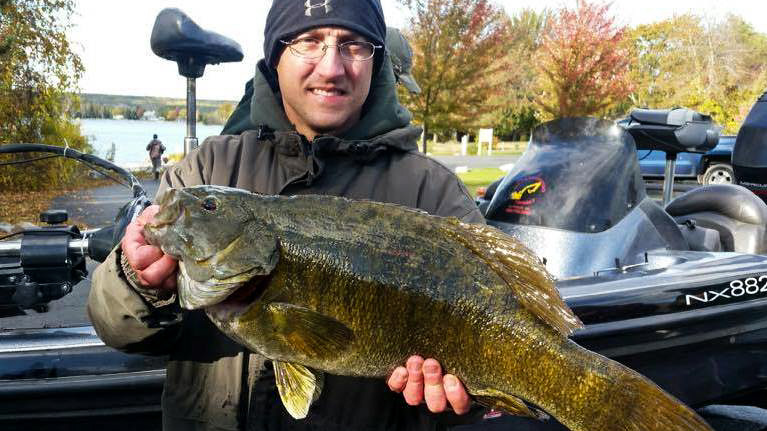Record Smallmouth Caught in Tourney
9.33-pound fish is the largest smallmouth caught in Michigan in more than a century

As any tournament partners would, Greg Gasiciel and Scott Somerfield started their day fishing on Michigan’s Hubbard Lake with the intention of catching the biggest bass possible. Little did they know that one of them would end up breaking the state’s smallmouth record that was established more than 100 years ago.
The pair was fishing in a local Bass Anglers of the Sunrise Side derby on Sunday, Oct. 18, 2015, when Gasiciel’s green-colored twister-tail grub was engulfed by a giant smallie. The bass weighed 9.33 pounds (9 pounds, 5.28 ounces), according to the Michigan Department of Natural Resources, which verified the catch as the new state record the following evening.
The mammoth bass measured 24 1/2 inches long. The previous record smallmouth was a 9-pound, 4-ounce fish that was 27 1/4 inches long and was landed in nearby Long Lake by W.F. Shoemaker in 1906.
“Gasiciel’s fish was just massive,” says Kathrin Schrouder, the Michigan DNR fisheries biologist who examined the fish. “It was short and stout, and its tail was just so thick.
“I’m getting asked how old a bass of this size would be. It’s hard to say,” she adds. “Even aging the fish by scale-sampling it would not be real accurate. Besides that, it would ruin the mounting of this fish, which the angler intends on doing.”
Schrouder also added that had the fish not been a possible state record, Gasiciel, of Rhodes, Mich., planned to release it back into the lake once it had been weighed in the tournament. For a fish to be eligible as a state record in Michigan, however, a DNR fisheries biologist must examine it.
Schrouder also added that a bass of that size and age is well past its reproductive prime, and was probably in its last year or two of life.
While many Michigan anglers have felt the next state record – if not world record smallmouth –would be caught from one of the surrounding Great Lakes, many of the state’s inland lakes also have the type of environment to grow potentially huge smallmouths.
As 8,850-acre Hubbard Lake in Alcona County proved, record-breaking bass can come from anywhere that the conditions are right.
